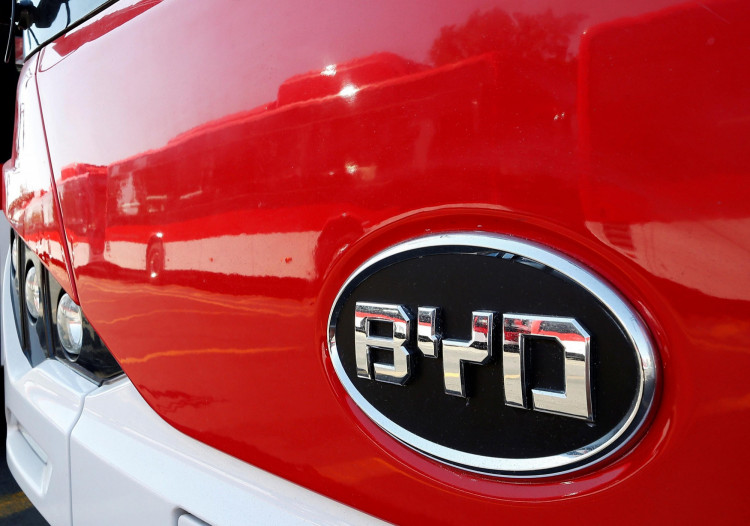Shares of Chinese electric vehicle giant BYD hit a record high on Tuesday after the automaker announced the rollout of its advanced driver-assistance system, DiPilot, across its lineup-including on a model priced below $10,000. The system will integrate artificial intelligence from DeepSeek, a rising AI startup that has drawn comparisons to OpenAI.
BYD's stock surged over 4% in Hong Kong trading to an all-time high of 345 Hong Kong dollars ($44.24) before paring gains. The rise follows a 21% rally last week ahead of the company's Feb. 10 product event, where it unveiled its new autonomous driving push.
At a livestreamed event Monday, BYD Chairman Wang Chuanfu framed driver assistance as an essential automotive feature, comparing it to seat belts and airbags. "2025 will be the first year of intelligent driving for all," Wang said, emphasizing that automation would soon become a standard safety component in all cars.
The automaker's DiPilot system will be included at no extra cost in many BYD models, including a low-cost vehicle priced at 69,800 yuan ($9,555). Analysts at Nomura called this a significant milestone, stating that BYD appears to be "the first automaker in China to offer such advanced driver-assistance capabilities for a vehicle below 70,000 yuan."
BYD's move is expected to intensify the already fierce competition in China's electric vehicle sector, where price wars and rapid technological advancements are reshaping the industry. Tesla, which has dominated the global driver-assist space with its Full Self-Driving (FSD) software, has yet to receive approval to roll out the system in China.
DeepSeek's AI integration is a key differentiator for BYD, adding intelligence-driven automation that aims to match or exceed offerings from competitors such as Tesla, Xpeng, and Huawei. "The DeepSeek integration is very significant because now there's a homegrown standalone AI technology that BYD can work with," said Tu Le, managing director of Sino Auto Insights. "This puts BYD firmly back in the driver's seat dictating the pace of technological features."
Chinese automakers have steadily expanded driver-assistance technology, making it a selling point in a crowded market. Xpeng was an early leader in deploying driver-assist software in urban environments, launching in Guangzhou in 2022 before expanding to major cities such as Shanghai and Shenzhen. Li Auto, Huawei, and Nio have also introduced features such as automatic parking and highway autopilot, with many relying on Nvidia's chips for computing power.
BYD's announcement is expected to put additional pressure on these players. This move “puts their competitors on their heels," Le said, pointing out that Tesla and other automakers may need to reconsider pricing models for driver-assistance features in China.
Tesla's most advanced driver-assistance system, FSD, is currently offered in the U.S. for a subscription fee of $99 per month or a one-time payment of $8,000. However, it has not yet been approved for use in China due to regulatory restrictions and geopolitical tensions. CEO Elon Musk has said he hopes to gain approval by late 2024, though the company faces hurdles in adapting the software to meet Chinese data security laws.
Beyond domestic competition, BYD's AI-powered driver-assist system may also face challenges in Western markets. The DeepSeek integration ”increases the likelihood that BYD vehicles will face more difficulties entering Western markets like the U.S. due to national security reasons," said Brian Tycangco, an analyst at Stansberry Research.
Despite potential international barriers, BYD remains focused on expanding its AI-driven approach within China. More than 20 models equipped with the DiPilot system were launched on Monday, with the automaker emphasizing that smart driving technology will improve road safety by proactively monitoring conditions and avoiding hazards. BYD said AI models and big data would continuously refine the technology over time.
The company has rapidly scaled its EV business both domestically and overseas, surpassing Tesla in total vehicle sales last year. BYD now accounts for over 32% of China's new energy vehicle market, according to the China Passenger Car Association.






